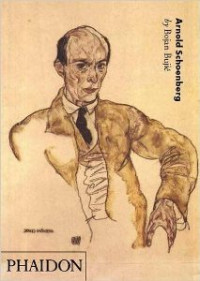Text
Arnold Schoenberg
Dalam buku ini, Bojan Bujic set ke dalam konteks budaya yang sesuai kehidupan sangat kaya dari komposer yang, bisa dibilang, kepribadian musik kunci dari abad kedua puluh. Sebuah kekuatan utama dalam perkembangan musik modern, Arnold Schoenberg (1874-1951) terkenal dengan meninggalkan nada suara dan memperkenalkan 12-nada metode 'seri' komposisi. Tidak ada kesepakatan apakah Schoenberg adalah komposer terbesar pada zamannya, terutama karena bahasa musik inovatif tidak menarik bagi semua orang yang datang setelah dia, tapi langsung atau tidak langsung, ia terpengaruh begitu banyak musisi dan pendengar sendiri dan generasi berikutnya yang sentralitas nya tidak dapat diperdebatkan. Selain karyanya sebagai komposer, Schoenberg adalah seorang ahli teori penting dari musik tonal dan guru sangat berpengaruh, dengan Anton Webern dan Alban Berg di kalangan murid yang paling terkenal. Dibesarkan dalam kehidupan budaya yang kaya dan kosmopolitan Wina, Schoenberg mulai bermain biola pada usia sembilan dan mulai bereksperimen dengan komposisi segera.
In this book, Bojan Bujic sets into an appropriate cultural context the immensely rich life of a composer who is, arguably, the key musical personality of the twentieth century. A major force in the development of modern music, Arnold Schoenberg (1874-1951) is famous for abandoning tonality and introducing the 12-tone 'serial' method of composition. There can be no agreement as to whether Schoenberg is the greatest composer of his time, especially as his innovative musical language did not appeal to all who came after him, but directly or indirectly, he affected so many musicians and listeners of his own and of subsequent generations that his centrality cannot be disputed. In addition to his work as a composer, Schoenberg was an important theorist of tonal music and an enormously influential teacher, with Anton Webern and Alban Berg among his most famous pupils. Brought up in the rich and cosmopolitan cultural life of Vienna, Schoenberg started to play the violin at the age of nine and began experimenting with composition almost immediately, but his education was cut short by the death of his father in 1889. Schoenberg had no formal training in music until he was in his late teens, and throughout his life he remained proud of the fact that so much of what he had absorbed as a youth about music and literature derived from his own tenacity and sense of purpose
Ketersediaan
Informasi Detail
- Judul Seri
-
-
- No. Panggil
-
780. 72 Buj a
- Penerbit
- New York : Phaidon Press Ltd.., 2011
- Deskripsi Fisik
-
234 hal.; 23 cm
- Bahasa
-
English
- ISBN/ISSN
-
978-07148-4614-9
- Klasifikasi
-
780. 72
- Tipe Isi
-
-
- Tipe Media
-
-
- Tipe Pembawa
-
-
- Edisi
-
-
- Subjek
- Info Detail Spesifik
-
-
- Pernyataan Tanggungjawab
-
-
Versi lain/terkait
Tidak tersedia versi lain
Lampiran Berkas
Komentar
Anda harus masuk sebelum memberikan komentar

 Karya Umum
Karya Umum  Filsafat
Filsafat  Agama
Agama  Ilmu-ilmu Sosial
Ilmu-ilmu Sosial  Bahasa
Bahasa  Ilmu-ilmu Murni
Ilmu-ilmu Murni  Ilmu-ilmu Terapan
Ilmu-ilmu Terapan  Kesenian, Hiburan, dan Olahraga
Kesenian, Hiburan, dan Olahraga  Kesusastraan
Kesusastraan  Geografi dan Sejarah
Geografi dan Sejarah